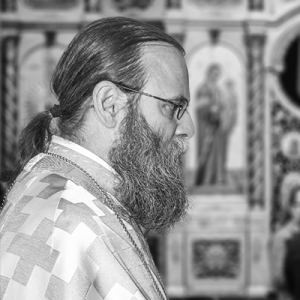“Walking the Talk” — Almsgiving
— Fr. Bohdan Hladio
September, 2008 A.D.
At the beginning of the 6th chapter of the Gospel of St. Matthew Jesus teaches us about prayer, fasting, and almsgiving. These three fundamental Christian acts compose an unbreakable and interrelated trinity.
Sometimes, for example, we pray, but nothing seems to come of it. Why? Our prayer is not heard without fasting and alms.
“Cornelius said, Four days ago I was fasting until this hour; and at the ninth hour I prayed in my house, and behold, a man stood before me in bright clothing, and said ‘Cornelius, your prayer has been heard, and your alms are remembered in the sight of the Lord…’” (Acts 10:30)
The old English word “almsgiving” is a translation of the Greek eleomosini or the Slavonic dila mylostynia and literally means “deeds of mercy”. The Greek word eleos can be translated “steadfast love”. It is the manifestation of God’s loving-kindness to us, as well as the loving kindness we are obliged to extend to our neighbour. “Be ye therefore merciful, as your Father also is merciful” (Lk. 6:36).
As the word itself indicates, almsgiving has to do with giving. What are we to give? To whom? How much should we give? How should we give?
Alms or deeds of mercy are usually directed to help the poor and/or support the Church. People usually associate almsgiving with material gifts. This includes gifts of money (financial support for the poor, the Church, charitable organizations, etc.), material goods (food, building materials, furniture) or talents (bookkeeping, construction, or any other talent we can use to benefit the poor or the Church).
If donations of money comprise one aspect of our deeds of mercy, then how much should we give? The biblical norm is 10%. This biblical tithe (Gen. 14: 18-20, 28: 22; Lev. 27:30-33; Mt. 23:23) was mandated by God to support the temple and the poor. Nowadays we should probably give a portion of our tithe to support the Church, and another portion to support the poor. Ideally, the tithe we give in support of the poor will be given, where possible, through church agencies (and it’s worth remembering that until very recent times it was the almost exclusive purview of the Church to support the poor).
May people, reading the previous paragraphs, might react by saying “Father, I’ve barely got enough to live on! I can’t afford to give up 10% of my income!” Well, there are two responses to such reactions. One is to remember that when Jesus said that it’s “easier for a camel to go through the eye of needle than for a rich man to enter the kingdom of God” he finished off the thought by saying “with God all things are possible”. The second is to remember the admonition of St. Basil the Great:
“He who does not feed the poor will feed the fires of hell.” (c.f. Mt. 25:36 ff)
In the book Mere Christianity C.S. Lewis responds to the question “how much” by suggesting that we should give enough so that we feel it. If our charitable giving prevents us from indulging ourselves as much as others who are making more or less the same amount of money that we do, then we are probably on the right road. The example for giving which Jesus holds up for us in the Gospel is the poor widow, whose two mites were worth more than the great donations of the rich. She gave out of her need, while the well-to-do gave out of their excess (Lk. 21: 1-4).
How are we to give?
“Take heed that you do not do your charitable deeds before men, to be seen by them. Otherwise you have no reward from your Father in heaven. Therefore, when you do a charitable deed, do not sound a trumpet before you as the hypocrites do in the synagogues and in the streets, that they may have glory from men. Assuredly, I say to you, they have their reward. But when you do a charitable deed, do not let your left hand know what your right hand is doing, that your charitable deed may be in secret; and your Father who sees in secret will himself reward you openly.” (Mt. 6: 1-4)
Christianity has value for us insofar as it costs us something. Supporting the Church and the poor is not an optional activity for Christians. But we must always do the right thing for the right reason—out of love for God and neighbour, not out of vainglory, egoism, pride, or a desire for recognition.
“The bread you do not use is the bread of the hungry. The garment hanging in your wardrobe is the garment of the person who is naked. The shoes you do not wear are the shoes of the one who is barefoot. The money you keep locked away is the money of the poor. The acts of charity you do not perform are the injustices you commit.”
— St. Basil the Great

